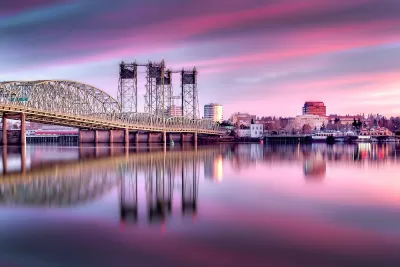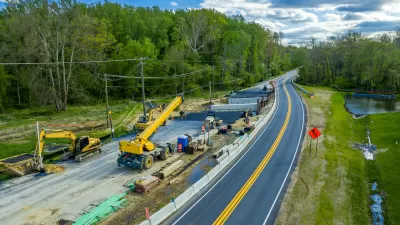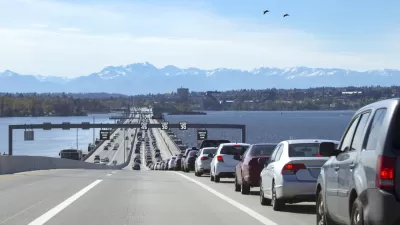The environmental impact report for a massive highway project in the Pacific Northwest ignores the reality of induced demand.

A $7.5-billion highway expansion project in the Pacific Northwest is in “deep denial,” writes Ryan Packer in The Urbanist, noting that the proposed widening of Interstate 5 and replacement of the Columbia Bridge between Washington and Oregon ignore the well-proven concept of induced demand.
As Packer explains, “After months of delay, the IBR team has finally released its draft environmental review, one of the biggest hurdles left to clear before it can start construction, still targeted for sometime in 2026.”
The project is the largest in Pacific Northwest history and will add two “auxiliary” lanes, rebuild seven interchanges, and extend light rail into Vancouver, Washington. “However, the shiny new document leaves out an essential consideration when it comes to projecting the future effects of I-5 expansion in this long-constrained corridor, an omission that would have been much less noticed in a decade ago but which sticks out like a sore thumb now.”
For Packer, the project is another example of archaic thinking that prioritizes cars and will ultimately create more traffic. “To present the IBR as a climate win, the project team is framing a 23% increase in total traffic as resulting in a net reduction in emissions largely because of a broader transition to electric vehicles that is wholly outside the project’s control. But they also cite a reduction in stop-and-go traffic as leading to future emissions reductions, another myth has has been fully refuted for years.”
FULL STORY: Pacific Northwest’s Largest Highway Project Ever Is in Deep Denial

Alabama: Trump Terminates Settlements for Black Communities Harmed By Raw Sewage
Trump deemed the landmark civil rights agreement “illegal DEI and environmental justice policy.”

Study: Maui’s Plan to Convert Vacation Rentals to Long-Term Housing Could Cause Nearly $1 Billion Economic Loss
The plan would reduce visitor accommodation by 25% resulting in 1,900 jobs lost.

Planetizen Federal Action Tracker
A weekly monitor of how Trump’s orders and actions are impacting planners and planning in America.

Wind Energy on the Rise Despite Federal Policy Reversal
The Trump administration is revoking federal support for renewable energy, but demand for new projects continues unabated.

Passengers Flock to Caltrain After Electrification
The new electric trains are running faster and more reliably, leading to strong ridership growth on the Bay Area rail system.

Texas Churches Rally Behind ‘Yes in God’s Back Yard’ Legislation
Religious leaders want the state to reduce zoning regulations to streamline leasing church-owned land to housing developers.
Urban Design for Planners 1: Software Tools
This six-course series explores essential urban design concepts using open source software and equips planners with the tools they need to participate fully in the urban design process.
Planning for Universal Design
Learn the tools for implementing Universal Design in planning regulations.
Caltrans
Smith Gee Studio
Institute for Housing and Urban Development Studies (IHS)
City of Grandview
Harvard GSD Executive Education
Toledo-Lucas County Plan Commissions
Salt Lake City
NYU Wagner Graduate School of Public Service





























